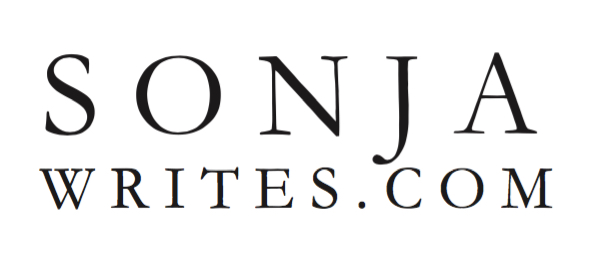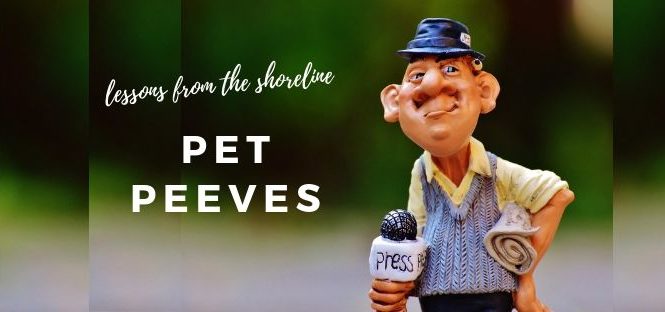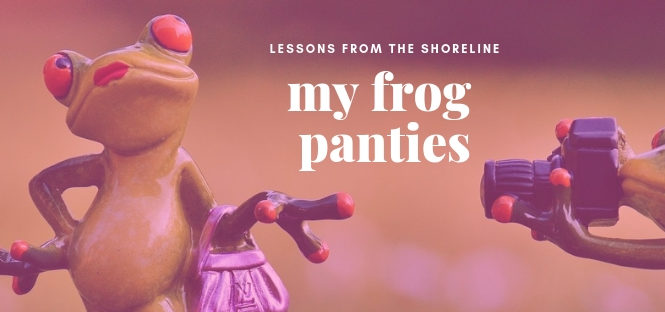I have a few word-usage pet peeves.
These word-usage issues didn’t start out as my own irritations, but rather, a very memorable college professor implanted them into my awareness when I was in journalism school. Once she did that, whenever I read or hear the misuse of these four words, it’s like tires skidding in my brain.
I honestly can’t remember this professor’s name — which is just horrible… (Some journalist I would’ve made, right?!) But I know she taught my magazine featuring writing course at the University of Florida in the early 1990s, and I remember she had very long white-blonde hair that smelled airy and clean — like a flower garden — whenever she’d walk between the aisles during class.
She was a very good teacher, however, she made me super nervous because she was a stickler for accuracy, very difficult to impress, and, she was the kind of gal that had a lot of pet peeves when she was evaluating your feature writing. (And, as you already know, I’m quite prone to making mistakes in my various “feature” articles on this blog!) But she was so adamant about the proper use of four particular words that I naturally made her standards my own. Here they are:
Using “over” instead of “more than” when measuring quantities that can be counted.
Using “last” instead of “past” to reflect on events that have already taken place, but that are not specifically final.
Let me address the first one — over — because the fact is, I’m constantly rattled by how often this word is misused around me. Even on my local San Francisco news station (which hires educated journalists, I’d like to assume?), it feels like no one honors this word like my professor taught me to all those years ago. And, I see it in written content, too. In fact, there’s a huge sign at this hamburger place Lou and I love to go to that says, “Over 50,000 burgers sold each week!” which just really disappoints me whenever I look at that sign…
So to get very technical, the word over is accurately used to describe the orientation of one object to another. “The cow jumped over the moon.” That’s the “most correct” way to use the word “over.”
So my burger place would be more accurate if they declared, “More than 50,000 burgers sold each week!” because more than applies to the comparison of quantities you can count. It’s a gigantic mental trigger for me that helps me see the “set-point” in the statement, and then it compels me to try to imagine even more!
So now you might be able to see how irritating it is for me to I hear people say, “Over 10,000 people attended that rally,” because it just doesn’t do that sentence the justice it deserves! (That’s a lot of people for heaven’s sake — and it’s more than I usually see all in one place, and certainly, more than I’d be willing to count in an attempt to get an exact number!)
To me, the distinction between “over” and “more than” isn’t subtle — it’s glaring. I guess it’s because it’s about accuracy… Yet the reality is, people don’t seem to care that much anymore about the accuracy of words that are technically only a few degrees off in meaning. Plus, interchanging these two words isn’t wrong… But it’s also not technically right either… And that makes me feel sad. We’re too busy to care, perhaps… Or, maybe we’re all lemmings that followed the first person to misuse the word “over” when he or she meant to say “more than,” and everyone just blindly followed along…
Murp.
OK. So now for “last” and “past.” I think I must have improperly used these two words a lot when I was taking that magazine feature writing class because this usage trigger feels like a bruise inside my brain. Back then, I was young and kind of fragile in my early days as a budding journalist, and I guess the reality of these two words still had little clarity to build on within the context of my life experiences. But, my teacher really cared about the distinction between these two words, and I totally get that now.
Anyway. The thing about “last” vs. “past” comes down to the concept of finality. The word last means it really is the final thing. You’ll never get another one like it. It’s the hard end…
Your last meal.
Your last kiss.
The last word…
Even when you say something such as, “Last night, we ate burgers at a place that has a poorly worded sign,” it truly signals that the night you most recently had will never happen again. It’s behind you now, and it’s over. Now, you’ll in all probability have many more “last nights” in your life — as in, you’ll have a “last night” every day! — but the moments that collectively made up that exact night will never ever happen the same way ever again. And…when you think about it, you might not know when a moment becomes your last — which is kind of an intense thought that only adds to the power of the word!
But clearly, the word last has some weight and it deserves respect.
Now “past” on the other hand, is more archival by definition. It’s a word that allows the moments that have already been lived to remain in a distinct collection of moments that has permission from that word to live beyond the finite recollection of time. Past is nostalgic and it creates this amazing amalgam of moments and feelings that are pressed into something more complete yet less specific. It’s an experiential tag to add when you’re looking back in time, while still believing in the idea there is more time to come.
As a person who has spent a lot of time working on my memoir over the past few years, the distinction between “last“ and “past” isn’t lost on me. I’ll never be done writing about my life — even tho I may be finished with my memoir someday — but for me, I simply can’t define my process of writing The Imposition Tour as something I’ve only been working on for the last few years. I suppose that’s because I think about the differences between the things that have been “my last” and the things that make up “my past” almost all the time.




